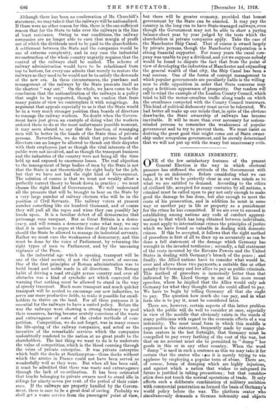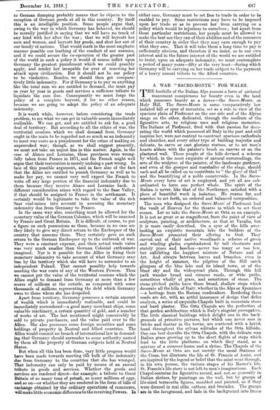THE GERMAN INDEMNITY.
ONE of the few satisfactory features of the present General Election is the way in which electoral pressure has stiffened the attitude of the Government with regard to an indemnity. Before considering what we can take, it is well to be perfectly clear in our own minds as to. what we are entitled to demand. According to the ethics of civilized life, accepted for many centuries by all nations, a criminal must be called upon to pay not only enough to make good the damage he has done, but also enough to meet the costs of his prosecution, and in addition he must in some way or another pay in life or property as a punishment for the crime he has committed. If we are ever to succeed in establishing among nations any code of conduct approxi- mating to that which has long obtained between individuals, we must apply to international crimes the principles of justice which we have found so valuable in dealing with domestic crimes. If this be accepted, it follows that the right method of procedure is first of all to draw up as accurately as can be done a full statement of the damage which Germany has wrought in the invaded territories ; secondly, a full statement of the costs incurred by the Entente Powers and the United States in dealing with Germany's breach of the peace • and finally, the Allied nations have to consider what would be, over and above these two payments, a suitable fine or other penalty for Germany and her allies to pay as public criminals. This method of procedure is immensely better than that indicated by Mr. Lloyd George in one of his more recent speeches, where he implied that the Allies would only ask Germany for what they thought that she could afford to pay. We have to begin by telling Germany all that she ought to pay. The question how much she can pay, and in what form she is to pay it, must be considered later.
There are, however, certain aspects of this latter problem which the public will do well to consider at once, especially in view of the muddle that obviously exists in the minds of many politicians with regard to the economic effects of a war indemnity. The most usual form in which this muddle is expressed is the statement, frequently made by many plat- form orators in the last fortnight, that Germany must be compelled to pay every farthing of the cost of the war, but that on no account must she be permitted to " dump " her goods in this or in any other country. When the word dunip " is used in such a sentence as this we may take it for certain that the orator Who ties it is merely trying to win applause by employing a popular term of abuse. There are, of course, forms of dumping which are highly injurious; and against which a nation that wishes to safeguard its future is justified in taking precautions ; but that consider. afion does not touch the normal operations of trade. It only affects such a deliberate combination of military ambition with commercial penetration as formed the basis of Germany's world policy before the war. The platform orator who simultaneously demands a German indemnity and objects to German dumping probably means that he objects to the reception of German goods at all in this country. By itself this is an intelligible position. Some people argue that, owing to the way in which Germany has behaved, we should be morally justified in saying that we will have no truck of any kind with her after the war ; that we will boycott her men and women, and boycott her goods,.and shut her out of our family of nations. That would mark in the most emphatic manner possible our loathing of the conduct of our enemies, and if we could secure the co-operation of the greater part of the world in such a policy it would of course inflict upon Germany the greatest punishment which we could possibly apply, and render her incapable for ever of renewing her attack upon civilization. But it should not be our policy to be vindictive. Besides, we should then get compara- tively little indemnity. For if Germany is to pay us anything like the total sum we are entitled to demand, she must pay us year by year in goods and services a sufficient tribute to liquidate the sum due. Consequently we must forgo the policy of a complete boycott, if for no other reason, because we are going to -adopt the policy of an adequate indemnity.
It is worth while, however, before considering the trade problem, to see what we can get in valuable assets immediately realizable. We can get, and are entitled to ask for, a good deal of territory. But according to all the ethics of war, the territorial cessions which we shall demand from Germany ought in the main to be regarded not so much as an indemnity to meet war costs as a punishment for the crime of making an unprovoked war; though', as we shall suggest presently, we must not take an unjust line in this matter. Again, in the case of Alsace and Lorraine, these provinces were wrong- fully taken from France in 1871, and the French might well argue that their restoration is merely undoing a past wrong. In face of this possible argument,. and in face also of the fact that the Allies are entitled to punish Germany as well as to make her pay, we cannot very well expect the French to write off any large portion of the financial indemnity due to them because they receive Alsace and Lorraine back. A different consideration arises with regard to the Saar Valley, if that should be assigned to France in the settlement. It certainly would be legitimate to take the value of the rich Saar coal-mines into account in assessing the monetary indemnity due from Germany to France. In the same way also, something must be allowed for the monetary value of the German Colonies, which will be annexed by France and Great Britain. It is difficult, of course, to put a figure on such possessions as these, because in no case are they likely to give any direct return to the Exchequer of the country that annexes them. They certainly gave no such return to the German Exchequer up to the outbreak of war. They were a constant expense, and their actual trade value was very much smaller than German Colonial enthusiasts imagined. Ner is it possible for the Allies in fixing their monetary indemnity to take account of what Germany may lose by the territory which she will have to surrender to an independent Poland. That cannot possibly help towards meeting the war costs of any of the Western Powers. Thus we cannot put the value of the territorial cessions which the Allies might to demand from Germany at more than a few scores of millions at the outside, as compared with some thousands of millions representing the debt which Germany owes to those whom she has despoiled. Apart from territory, Germany possesses a certain amount of wealth which is immediately realizable, and could be immediately surrendered—a good many merchant ships, some valuable machinery, a certain quantity of gold, and a number of works of art. The last mentioned might conceivably be sold to private purchasers, and the value paid over to the Allies. She also possesses some foreign securities and some holdings of property in Neutral and Allied countries. The Allies would commit no breach of international law in demand- ing that Germany should surrender to some authority named by them all the property of German subjects held in Neutral States.
But when all this has been done, very little progress would have been made towards meeting tlre bulk of the indemnity due from Germany to the countries that she has wronged. That indemnity can only be paid by means of an annual tribute in goods and services. Whether the goods and services are rendered direct—for example, a tribute to Great Britain of so many tons of potash, so many millions of eggs, and so on—or whether they are rendered in the form of bills of exchange obtained by the ordinary operations of commerce, will make little economic difference to the receiving Powers. In either case, Germany must be set free to trade in order to be enabled to pay. Some restrictions may have to be imposed upon her trade so as to prevent her from carrying on a policy which would be injurious to ourselves ; but apart from these particular restrictions, her people must be allowed to make the best use they can of their abilities and of the resources of their country in order that they may earn enough to pay what they owe. That it will take them a long time to pay is sufficiently obvious, and therefore if we insist, as in our own interest and in the future interest of the world we are entitled to insist, upon an adequate indemnity, we must contemplate a period of many years—fifty at the very least—during which Germany will be carrying on her trade subject to the payment of a heavy annual tribute to the Allied countries.







































 Previous page
Previous page